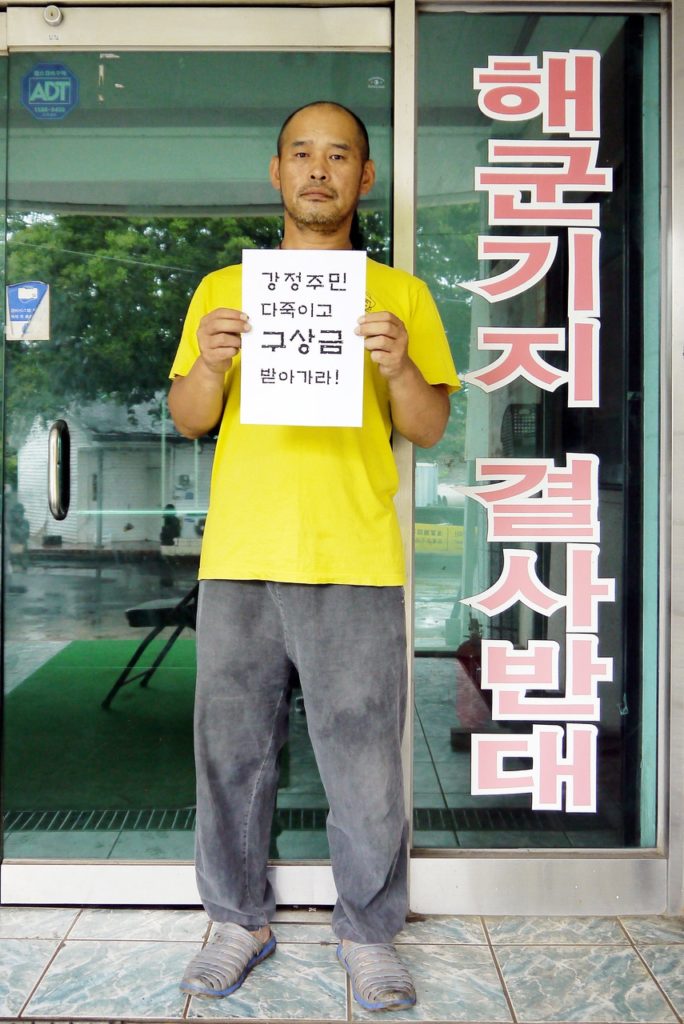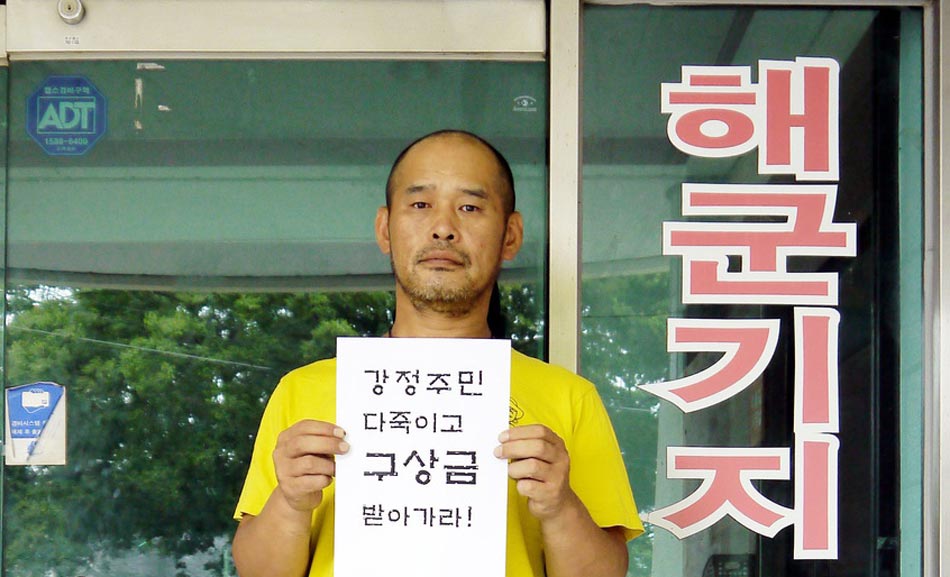
With indemnity, government apparently trying to send a message about what happens to people who oppose government projects
On Jan. 30, during the Lunar New Year holiday, I visited Gangjeong Village in Jeju Island. Faded and tattered yellow banners were fluttering in the fierce wind around the Jeju Naval Base, with slogans such as “No naval base in Gangjeong Village,” “Resolutely opposed to the naval base” and “Forfeit the right to indemnity.” The rough waves of the dark blue sea ceaselessly battered Gangjeong Port.
Today, the residents of Gangjeong Village feel a mixture of resignation and rage against the government. I met with Koh Kwon-il, vice chair of the village committee and chair of the action committee against the naval base. Koh and I were in the same class in high school. Koh has enjoyed drawing comics since his high school days, and he was always serious and optimistic. When he was attending graduate school in Seoul, he made a name for himself as a cartoonist, and his cartoons were syndicated in monthly magazines and sports newspapers. When he returned home to Jeju in 2008, after 26 years, he stood on the front line of the struggle. He did not stand by and watch what was happening to his home.
When I met this bronze-faced man at the site of the struggle, he no longer looked as he had in his late teens, but his personality remained mild and reasonable. Overcome with homesickness during his university years, he told me he had gone home and found healing for his body and soul by fishing and going for walks on the Gureombi Rocks.
The Gangjeong villagers’ campaign against the naval base is now in its tenth year. When the campaign began in Apr. 2007 with most villagers objecting to a unilateral decision by the minority to allow the base to be built, few thought it would last so long.
Despite the long struggle of the residents of Gangjeong Village, construction of Jeju Naval Base was completed in Feb. 2016. But the psychological and physical pain inflicted upon the residents during the construction process, as well as the damage to their property, continue today. More than 700 people were arrested by the police, and 392 cases were taken to court. They have been fined more than 400 million won (US$364,000). The naval base changed the face of the village and plunged the residents into conflict.
When construction ended on the base, President Park Geun-hye said she hoped that “this would be a significant opportunity for coexistence and harmony with the local community.” But when Samsung C&T asked to be compensated for the delay in the construction, the navy paid 27.3 billion won (US$23.64 million) and then stabbed the villagers in the back by demanding that 116 individuals and five organizations, including the village council, pay 3.45 billion won (US$2.98 million) just one month after the ribbon-cutting ceremony. In addition to this, Samsung C&T and Daelim Industrial are moving forward with a request for the navy to pay tens of billions of won in compensation.
After severely scarring the villagers during the construction of the naval base, the government, far from resolving the conflict, continues to provoke their anger. In Oct. 2016, 165 lawmakers from both the ruling and opposition parties submitted a resolution asking the government to forfeit its right to indemnity. “The government must never use lawsuits against the people (to whom sovereignty belongs) to push the people to the brink of the cliff of pain,” the lawmakers said.
Not only Jeju Island Governor Won Hee-ryong and the Jeju Island legislature but even the Jeju Island Lawyers’ Association advised and urged the government to forfeit its right to indemnity, but the government’s position is unshakeable. The government apparently intends this to be a warning to the public about what happens when people oppose a government project.
There is no precedent for the government demanding that its citizens pay it billions of won in restitution. During a meeting of the Gangjeong Village Council on Jan. 23, villagers angrily asked, “Is this a country?” They described the indemnity as “bloody pus” — sweat and blood squeezed out of hurting people.
“Just because it’s a government project doesn’t mean you can suppress the people‘s voices. The people have already endured so many inconveniences during their struggle to defend their community, and forcing them to pay restitution is state violence,” Koh said angrily.
The villagers are doing their best to avoid conflict. These people already experienced state violence during the Apr. 3 Incident, more than 70 years ago, and we must not dredge up that trauma. Unless we embrace the residents of Gangjeong Village, “coexistence” and “harmony” will be no more than empty words. The presidential candidates need to clean the bloody pus off the people of Gangjeong Village.
By Huh Ho-joon, Jeju correspondent
Please direct questions or comments to [english@hani.co.kr]
